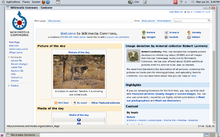- Conkeror
-
Conkeror 
Conkeror web browser running on Ubuntu Linux 10.04Developer(s) Shawn Betts Stable release 0.9.3 / January 6, 2011 Written in javascript Operating system Cross-platform Platform XULRunner Type Web browser License GNU GPL, GNU LGPL and MPL Website http://conkeror.org/ Conkeror is a Mozilla-based web browser designed to be navigated primarily by a computer keyboard. Its design is mainly patterned after the text editor GNU Emacs, with some influence from other programs, including vi.
It was originally written by Shawn Betts, the primary author of keyboard-driven ratpoison and Stumpwm tiling window managers. Formerly an extension for the Mozilla Firefox browser, it is now developed for XULRunner as a stand-alone application. Development of the extension version was abandoned in 2007.
Conkeror is released under the same set of free software licenses as Mozilla: the GNU General Public License, the GNU Lesser General Public License, and the Mozilla Public License.
Contents
Browsing
Conkeror emphasizes key bindings and keyboard-based browser navigation.[1] By pressing a key (
f, for "follow", by default), Conkeror brings up a small, numbered label beside every element within the current view[2] on the page that can be clicked. The user can type the number of the link andENTERto follow the link.[3]Conkeror has a large number of key bindings, and can be customized to have more. The following are some example default key bindings:[4] (key bindings are case sensitive[5])
Key binding Action gsearch/go to URL ffollow link C-h iConkeror User Manual C-h bComplete list of key bindings C-ssearch text forward[2] Like Emacs, Conkeror makes use of buffers in order to allow multiple pages to remain open at the same time (similar to tabs in traditional browsers). Users can open new buffers and navigate through them using key bindings—for example,
C-u C-fopens a hyperlink in a new buffer,C-u C-ggoes to a URL or search term in a new buffer, andC-u C-h iopens the start page in a new buffer. Buffers can be cycled through usingM-nto go to the next buffer orM-pto go to the previous one.C-x bdisplays a list of the currently open buffers from which the user can choose a buffer using the up and down arrows.[6]Customization
The Conkeror browser can be customized in many ways using javascript as the scripting language, much in the way that Emacs uses Emacs Lisp. Customizations can be as simple as rebinding keys, but can be more involved; for instance, writing new interactive commands. By default, Conkeror looks for these customizations in ~/.conkerorrc. If ~/.conkerorrc/ is a directory instead of a file, then all the contained files will be read, which is a technique to enable modularization of bigger customizations.
Conkeror also ships with a number of loadable javascript modules, some of which provide core functionality; others are user-loadable and provide additional functionality.[6]
Conkeror has modes in which the key bindings, page display or browser behaviour become page-specific.[1] Some modes, like xkcd-mode, come by default. In xkcd-mode, the message which is normally displayed when the user mouses over the comic strip is instead displayed in a special font below the strip. Other modes include those for Google Maps, Reddit and YouTube, and modes can be user-defined as well.[6]
Name
The name of the browser is pronounced identically to that of the better-known Konqueror web browser from the KDE suite of desktop software, although according to the Conkeror FAQ, "the full name of the browser in spoken English is 'Conkeror (with a C)'" to avoid confusion.
Also according to the FAQ, the name derives from the name given to the winner of a game of conkers, a children's game involving horse chestnuts on a string, as well as from a brand of beer also called Conkeror.
See also
Notes
- ^ a b Larson, Eric (2010-03-31). "Conkeror: The Best Web Browser (For Emacs Users)". O'Reilly Media. http://broadcast.oreilly.com/2010/03/conkeror-the-best-web-browser.html. Retrieved 2011-06-30.
- ^ a b "Conkeror: "Firefox for Emacs users"". SaltyCrane Blog. 2009-04-01. http://www.saltycrane.com/blog/2008/01/firefox-for-emacs-users/. Retrieved 2011-07-06.
- ^ Spalteholz, page 2
- ^ Harding, page 1
- ^ "Conkeror Keys". Stray Notes. April 2011. http://stray-notes.blogspot.com/2011/04/conkeror-keys.html. Retrieved 2011-07-06.
- ^ a b c Harding, page 2
References
- Leo Spalteholz; Kin Fun Li, Foad Hamidi, Nigel Livingston (21-25). "KeySurf: A Character Controlled Browser for People with Physical Disabilities" (pdf). Beijing, China: International World Wide Web Conference Committee (IW3C2). pp. 9. http://www2008.org/papers/pdf/p31-spalteholzA.pdf. Retrieved December 4, 2008.
- Harding, David A. "The Conkeror Web Browser Conquers Small Screens" part 1 2 3 4. Belltown Media Inc., Jul 01, 2009. Accessed 2011-06-30
External links
- Official website
- Conkeror at the Emacs Wiki
- Conkeror - browsing the web, emacs-style (with Conkeror customizations)
 Emacs
EmacsGNU Emacs and derivatives 
Other Emacs implementations Climacs · Epsilon · Freemacs · EINE · Gosling Emacs (Mocklisp) · Hemlock · JOVE · mg · MicroEMACS · Multics Emacs · GNU TeXmacs · vile · Zile · Zmacs · ZWEIEmacs modes Emacs internals Other  Emacs on Wikimedia Commons ·
Emacs on Wikimedia Commons ·  Emacs on Wikiquotes
Emacs on WikiquotesGopher Active clients F/OSSAmaya · Arachne · Camino · Classilla · Conkeror · ELinks · Firefox for mobile[citation needed] · Galeon · Gnuzilla · K-Meleon · K-Ninja · Kazehakase · Line Mode Browser · Lynx · Songbird · Mothra · W3m ·
ProprietaryDiscontinued clients Agora · Arena · AT&T Pogo · Beonex Communicator · Cello · Cyberjack · Mozilla Firefox 1, 2, 3 · Flock · IBrowse · Internet Explorer 2, 3, 4, 5, for Mac · Minimo · Minuet · Mosaic · Mozilla Application Suite · Netscape Browser · Netscape Communicator · Netscape Navigator 9 · SeaMonkey · SlipKnot · tkWWW · UdiWWWServer software Persons See also Gopher+ · GopherVR · Jughead · Libwww · Phlog · SDF Public Access Unix System · Veronica · CCSO Nameserver · Wide area information serverCategories:- Emacs
- Gopher clients
- Free web browsers
Wikimedia Foundation. 2010.
